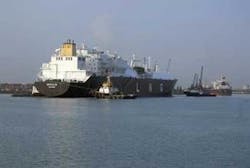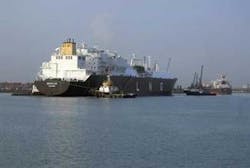Latin American LNG market holds both risks and rewards
Jose Luis Vittor, Bracewell & Giuliani LLP, Houston
The LNG market in Latin America offers significant opportunities to producers based in other parts of the world, but these opportunities must be balanced against the region’s political risk. Risk factors include not only nationalization, as happened in Bolivia during 2006, but also the challenges posed by the still-developing regulatory framework in many Latin American countries.
Photo courtesy of Shell Global Gas & Power
Even a detailed and agreed LNG project can quickly face roadblocks if a country’s governmental regime changes, with resulting and sudden changes to the investment conditions.
New investors in the region may not yet realize that the electoral process in specific Latin American countries can totally transform what they initially thought was a good market opportunity. There are still countries, such as Colombia, that are strongly market-oriented. However, with the exceptions of Chile and Perú, no LNG deal in South America can count on a clear, risk-free sovereign and regulatory environment.
An important LNG market dynamic in Latin America today is the large number of new energy investors that are now government-owned entities seeking new market opportunities. These companies typically do not have extensive technical know-how in LNG projects or terminal operations, and are inexperienced in dealing with and understanding the needs of private investors. Thus, they would benefit from working with experienced industry partners in developing markets and projects.
However, these state-owned enterprises must adopt the required flexibility to work with private-sector partners. This is particularly true because the trans-regional parties in an LNG transaction may operate in completely different legal environments adapting institutes of common law into civil law and different management standards.
Foreign LNG companies entering into transactions with Latin American energy producers must be prepared to specify all the contract terms, many of them new to the host country regime that could apply to their particular project. Standard administrative contractual language is rarely adequate in complex cross-border deals. All terms regarding finance, operations, confidentiality, and other concerns should be customized and clearly spelled out.
Any deal structure should particularly focus on defining all possible risks. That includes currency conversion risk, sovereign risk, financing guarantees, supply, and customer agreements.
Companies obviously enter into these ventures because they believe the rewards make the risk worth it, but it is vital to be realistic about what can go wrong. Foreign companies should especially have a realistic timeframe for a project payoff and ask themselves specific questions, such as:
- What is the certainty of the cash flow?
- If you review the jurisdiction’s track record, could your cash flow tolerate similar shocks?
- What are the chances that local governments could expose or threaten the operations and cash flow?
There should be a defined exit strategy at the end of that time, and the strategy should be mapped out at the outset of the transaction.
If the risk issues are properly addressed, Latin America holds considerable LNG market promise. These are some of the key opportunities to be found in the region:
- Peru has tremendous potential. The Peru LNG project is already underway as a consortium between major companies from the United States, Spain, and Korea. It will involve the construction of transportation, liquefaction, and terminal facilities on the country’s Pacific coast. It’s also important to note that Peru has just elected a new president, and the new administration seems to offer a prospect of political stability.
- Brazil is expanding throughout the international market. After the Bolivian nationalization process, the import of Bolivian gas would be carefully monitored and LNG imports could be used to diversify supply and reduce its risks. Brazil’s Petrobras plays a key role in the market and will be a large player in any significant project.
- Bolivia and Venezuela have substantial gas reserves, but after the contract renegotiations in both countries, political risk is still an issue. The same is also true for Ecuador, which earlier in 2006 terminated one major multinational oil company’s production agreement and threatened with an asset seizure.
- In the Caribbean, Trinidad and Tobago should be singled out. It is the largest LNG supplier to the United States and has been a model in the development of LNG facilities.
To take advantage of Latin American opportunities, local supply agreements offer a way to secure market position and adapt to the political, regulatory, and market realities. For example, the LNG project that was announced in Bolivia through Chile that caused a nationalistic reaction in Bolivia was primarily aimed to serve the US market. Projects aimed at supply for countries like Chile and Mexico have been able to negotiate operating contracts under state control and participation, but with clear market rules.
Finding the right support is important in any long-term LNG project where investment recovery takes a substantial amount of time. Producers must secure the commitment to buy significant amounts of gas that make the investment worthwhile.
It is also undeniable that the regulatory framework in most Latin American countries is not fully ready to support sophisticated LNG projects. Investors in a multibillion dollar LNG project should thus be realistic.
As the lessons from the Bolivian nationalization are still in all the industry’s mind, much could change in a few months or years, so be very wary of long-term commitments that do not completely detail the rights and responsibilities of all parties.
The author
Based in Houston, Jose Luis Vittor is an international attorney for Bracewell & Giuliani LLP. He can be reached at [email protected].


